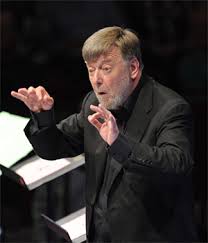The muscular humanity of Stuart Skelton’s Gerontius informs every aspect of Sir Andrew Davis’ approach to work as revealed last night. Where cathedral performances can seem distant and ethereal there was an imminence about the reading which was powerfully moving throughout, even shattering at times in its intensity. Stuart Skelton brings us a man close to death but still fully aware of his own humanity, and it is this which carries through into the second part. The pain of Take me away mirrors that of In thine own agony from the first part. His powerful, yet beautifully sung, performance was matched by the radiance of Sarah Connelly’s Angel. No need here for a cautious approach to a fearful soul, her strength matched his and the outpouring of alleluias was thrilling.
David Soar was a young sounding Angel in both parts but matched the humanity of the others with a depth of feeling of his own.
The BBC Symphony Chorus was finely focussed throughout, with many telling moments. The end of Praise to the Holiest seemed more powerful that its explosive opening. The chorus of Demons started quite conventionally but became ever more clipped and aggressive as it progressed, dying to a pathetic dispossessed. The gently rolling finale brought subtle waves of sound which ebbed and flowed around the soul of Gerontius.
In the Barbican Hall it is very difficult to create a real ppp so Sir Andrew did not try. What he was able to do instead was create a range of dynamic intensity which was always dramatically apt. The opening of the first part was more autobiographical than spiritual, and that of the second reflective, almost charming in its relaxation.
We have been privileged to hear a number of very fine performances of Gerontius recently but this will surely be recalled as one of the finest.
It was being recorded for broadcast on 21 April. Catch it if you can live or via iPlayer or website.
Next Saturday, The Apostles.

